How to Integrate Social Media with Your Business Website in 2025
By Ray O’Donnell

According to recent reports, social media is the fourth most effective sales channel. In fact, marketers who leverage social media consistently outperform the competition by a whopping 78%.
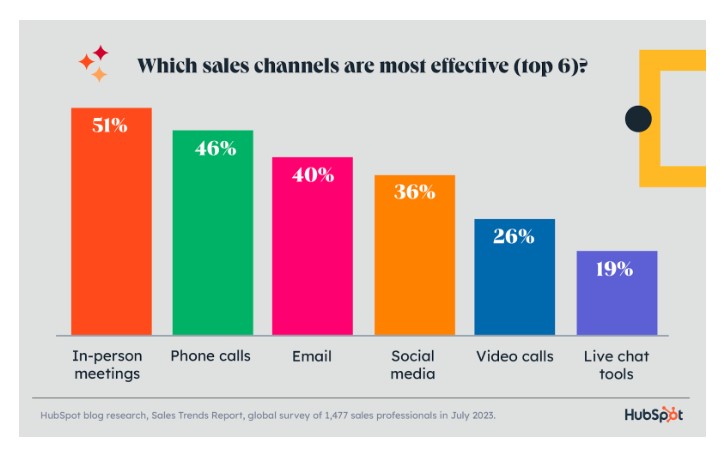
Image via HubSpot
In this post, I’ll discuss how to integrate social media with your business website in 2025 to enhance reach and engagement.
Integrating social media with your business website goes beyond adding social media icons to your homepage. It can enhance your online presence and boost your brand's visibility, whether you're selling everyday products or niche items like Massage Tables, where building trust through customer engagement is crucial.
Why Integrate Social Media With Your Business Website?
Integrating social media with your business website is essential for the following reasons:
- Increases brand visibility and expands audience reach
- Drives significant growth in lead generation and sales
- Drives more website traffic and boosts engagement
- Encourages backlinking
- Builds brand loyalty and trust
How To Integrate Social Media With Your Business Website?
The average social media user juggles 6.7 platforms monthly. So, select the platforms that suit your business needs and integrate them with your website.
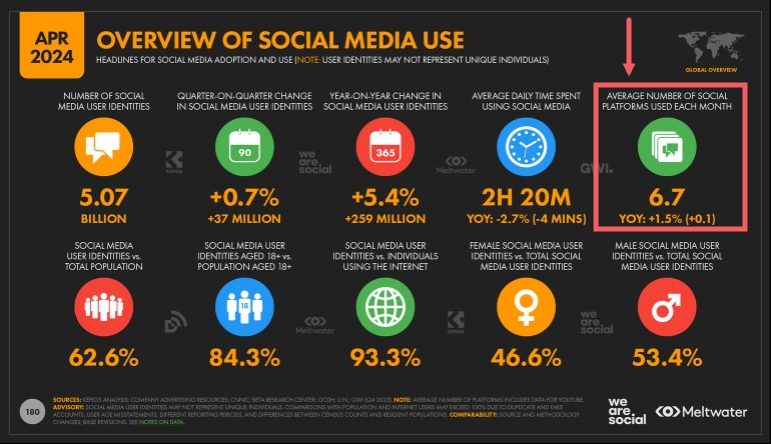
Image via DataReportal
Here’s how to integrate social media with your business website:
Step 1: Identify Your Social Media Sweet Spots
Understanding your target audience's social media preferences is crucial. Are they LinkedIn professionals seeking industry insights or Twitter users following current events? Conduct research to identify your target audience and their preferred social platforms. Make sure to also explore your competitors' strategies and use an unblocker in case you need to access geo-restricted websites to gather insights.
Here are the most popular social media platforms to consider.
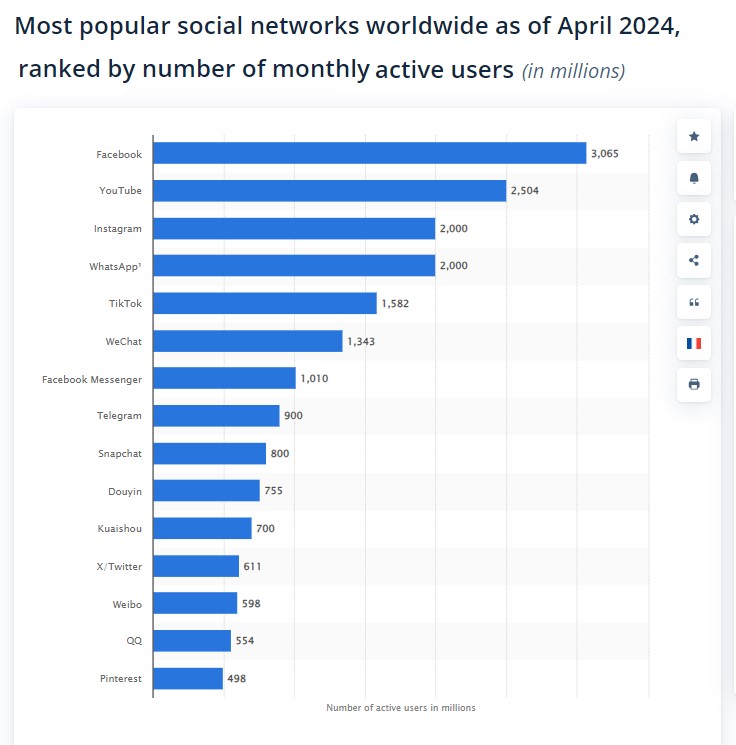
Image via Statista
Step 2: Make Connecting Easy
Viewers' attention spans gradually reduce as the available content options increase. Research shows that their attention span is approximately 8 seconds.
So, ensure viewers can interact with your brand with a single click.
Consider using:
- Prominent Social Media Buttons and Links: Prominently display the social media icons on your website's homepage, blog posts, and contact page. These will help users locate and connect with your brand's social media accounts. Enhance your brand’s online presence by creating a eye-catching logo using logo maker and featuring it on key pages.
Here’s an example of social media icons on Attrock’s website.
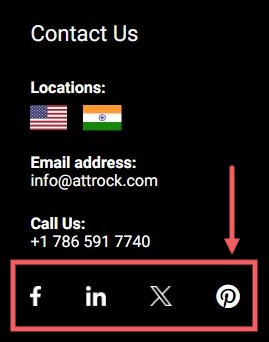
Image via Attrock
- Follow and Share Buttons: You can strategically place these on the relevant sections of your website so visitors can easily share your content.
Here’s a sample of social share buttons.

Image via Sharethis
Step 3: Embed Social Media Feeds
Integrating social media with your business website transforms your website into a dynamic hub. Choosing the right Cloud Hosting Price ensures your site can handle increased traffic from social engagement without slowing down.
Embedding social media feeds into your website varies depending on your aggregator and website builder. Some platforms also offer developer tools or plugins that make the process effortless.
Here’s how Ama’s Cooking Hub embedded its YouTube channel into its website.

Image via Ama’s Cooking Hub
Step 4: Integrate Social Login
Here’s how to integrate social media with your website beyond sharing content. You can leverage social logins to streamline the user experience.
With social logins, visitors can sign up or log in using their existing social media credentials without creating a separate account on your website. Integrating a social login saves time and effort, reduces friction, increases sign-ups, and improves data accuracy.
The process involves implementing plugins or APIs from the social media platforms you want to integrate. You can also get user-friendly options from most website-building platforms.
Udemy has utilized this feature perfectly for their learners.
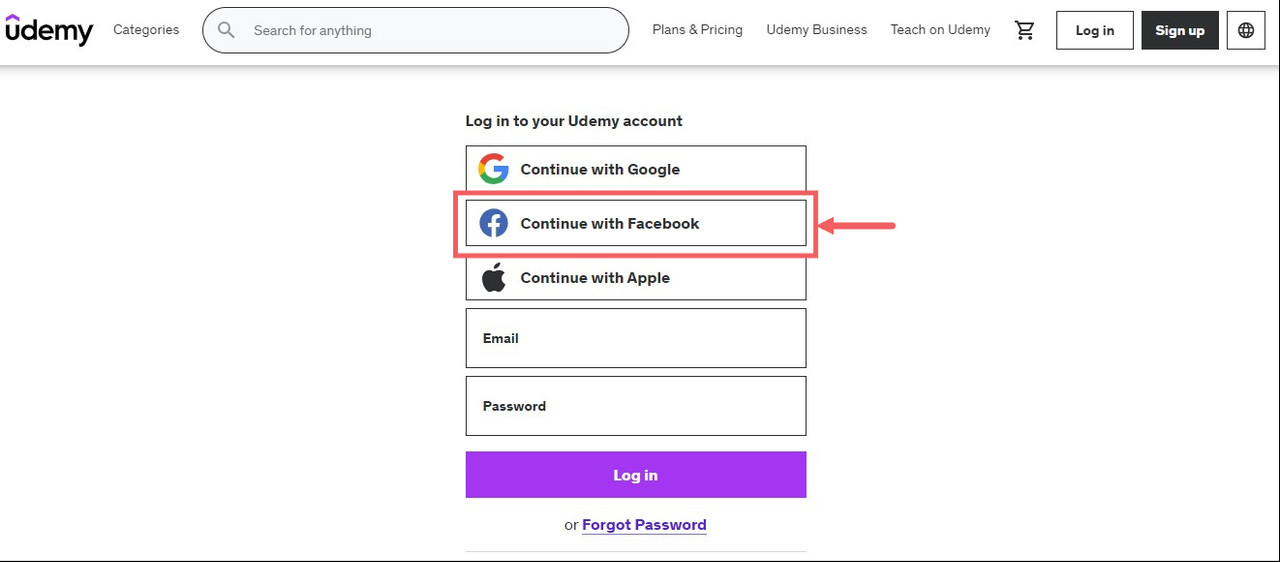
Image via Udemy
Step 5: Spice Things Up with Live Content
Live streaming is another way to integrate social media platforms with your website. It allows you to connect and interact with your audience in real time.
Live streams have an element of excitement and authenticity. It shifts the focus away from sales and encourages viewers to interact with your website.
Integrating live streaming capabilities on your website enables you to host Q&A sessions and product launches. It also lets you promote behind-the-scenes content and upcoming events.
Amazon has aced live streaming through Amazon Live. It allows shoppers to livestream their various product-related activities.

Image via Amazon Live
Hire social media virtual assistants to plan and promote your live streams while incorporating Strategic Foresight to enhance planning and decision-making. They can gather and analyze data from live streams to deliver a captivating and informative live-stream experience.
Step 6: Offer Social Commerce Options
Social media has evolved beyond its original purpose of connecting people to become a powerful tool for lead generation. In fact, over 90% of millennials buy products advertised on social media.
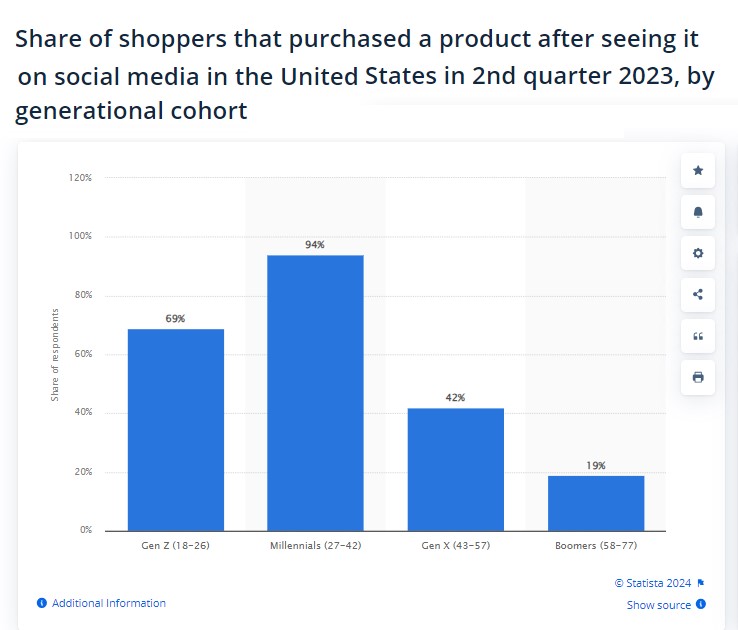
Image via Statista
Integrating social media with your business website promotes social commerce. Visitors can buy your product directly from the page without leaving the social platform.
A direct social-to-sale integration creates a seamless shopping experience and improves conversion opportunities. Direct social-to-sale integration lets you promote physical products, encourage digital downloads, and sell online courses.
Step 7: Automate the Process
Managing your social media presence across multiple platforms can be time-consuming and overwhelming. However, using an automation platform helps you streamline the process, making it easier to schedule posts, monitor engagement, and maintain consistency.
Here is how to integrate social media with your website using automation:
- Social Media Marketing Tools: Utilize social media marketing tools to maintain an active social media presence. This blog post by Attrock will help you discover the best social media marketing tools for your business needs.
- Social Media Feed Aggregators: Using tools like Buffer, Hootsuite, and other Twitter Aggregator for your social media updates from various platforms. It then combines these updates into a single, user-friendly website feed.
- Social Media Virtual Assistants: They help you manage your channels to maintain a solid social media presence and customer support, while Canny alternatives can assist in streamlining feedback management and product improvement.
Transform Your Website Today
You can transform your site into a dynamic hub by knowing how to integrate social media with your business website.
Doing so fosters two-way communication and establishes stronger connections. It keeps visitors informed and engaged. So, implement these tips and watch your online presence flourish.
Your Social Outsource Team
The Social Hire team never just do social media marketing.
Our specialists are a company that assists our customers further their presence online by giving online marketing on a regular basis.
You might like these blog posts How To Not Suck As A Speaker: 15 Ideas, How Startups Can Hire the Best Tech Talent, Four Common Instagram Myths for Business, and 3 Big Business Mistakes You Are Probably Making Right Now.
